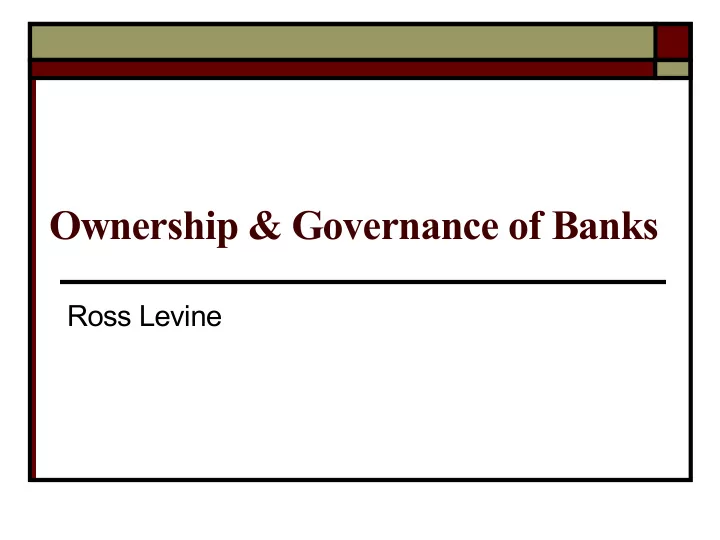

Ownership & Governance of Banks Ross Levine
Motivation and goals o Banks profoundly influence growth & equity n Regulation has 1 st -order welfare implications o Designing appropriate regulations, requires understanding of bank governance. So: n Ownership structure n How ownership structure and regulations interact in affecting governance and risk taking.
1. Who owns banks? Are banks widely-held? Who controls banks? Determinants?
Who owns banks? Data Ø 10 largest listed banks in each country Ø 244 banks across 44 countries
Who owns banks? Definition Controlling owner: direct + indirect control rights (CR) > 10% q Trace through possible pyramidal ownership structures q q Identify all major shareholder (i.e., > 5% of votes) q If any are corporations, find its ultimate owners (if any) Find controlling owner – if any -- with maximum votes q
Who owns banks? Definition Ø Widely-held Ø Controlling owner Ø Family (individual) Ø State Ø Widely-held (non-financial) corporation Ø Widely-held financial institution Ø Other (trust, foundation)
Who owns banks? Cash-Flow Rights Ø CF = cash flow right of controlling owner and zero if there is no controlling owner
Who owns banks? Widely Family State Fin Corp Other CF Country mean (CR) 0.25 0.39 0.14 0.07 0.02 0.14 0.26 % of owner (=x/0.75) 0.52 0.19 0.09 0.03 0.19 In 14 out of 44 countries, the controlling owner averages more than 50% of the CR. In Australia, Canada, Ireland, UK, & US, either NO bank has a controlling owner or the average is less than 2% of CR
Who owns banks? 1) Though enormous X-Country variation, Ø Banks are generally not widely-held Ø Individual / Family ownership is very important 2) Legal protection of shareholder rights helps account for X-Country differences: Ø When the law protects minority shareholders, less of a need for a large shareholder Ø When the law does not protect minority shareholders, widely held banks do not emerge.
How do ownership and regulation affect risk taking? Why would ownership affect regulation’s impact? Does it? Policy implications?
Owners, managers, and risk: Theory o Diversified owners seek more risk Than debt holders (Galai / Masulis, 1976; Esty, 1998). n Than non-shareholder managers (Jensen / Meckling, 1976) n o Thus: Risk-taking depends on the comparative power of owners n within the corporate governance structure of banks If regulations affect owners differently from managers, n then regulations impact on risk depends on the power of owners.
Owners, managers, and risk: Theory o Regulations affect risk incentives of owners differently from managers & debt holders o Examples: Deposit insurance intensifies risk incentives of owners n
Owners, managers, and risk: Theory More examples: Capital and activity restrictions n More capital à Reduce risk incentives of owners o Fewer activities à Fewer risk taking opportunities o Owner’s utility ß à compensate by risk Ý o (Koehn and Santomero, 1980; Boyd et al 1988; etc. n Also, more capital MIGHT not reduce risk-taking incentives of controlling owners
Broad testable predictions Banks with powerful owners will be riskier than widely-held o banks, ceteris paribus Conditional on owner’s wealth in bank n Conditional on managerial shareholdings n Regulations have different effect on banks with powerful o owners than widely-held banks Subject to same conditions n
More powerful owner à less bank stability Fixed IV effects CF -1.406*** -0.504* -1.180*** -3.484*** -0.913** Revenue growth 0.075 0.261 0.232 0.434 -0.125 Per capita income 0.161*** 0.059 0.413* Rights 0.091 Capital requirements 0.185* Capital stringency 0.05 Restrict -0.094** DI -0.568*** Enforce -0.046 Concentration -0.37 M&A 0 Size -0.098* Loan loss provision -0.036 Liquidity 0.724 Large owner on mgt board 0.003 Managerial ownership 0.363 Number of countries 46 46 46 43 37 Observations 251 251 251 248 189 R-squared 0.14 0.03 0.19 -- 0.37
Robust ... Control for owner’s wealth concentration Ø Founder on board (3%) Ø Descendants on board (14%) Ø Managerial shareholdings Ø Large Shareholder on board (35%) Ø Cash-flow rights of Senior Management Ø Average: 6% s.d.: 15% Ø
Impressions … Risk « ownership, not only a country trait. o Results are consistent with the following view: o Equity holders have an incentive to increase risk n The incentives frequently clash with the incentives of other decision n makers. Large owners have greater power to increase risk than small n shareholders Other measures of bank risk à similar results o
Now consider second prediction Regulations have different effect on banks with powerful o owners than widely-held banks
CF – Capital regulations CF 5.247** Stabilizing effects of capital Revenue growth 0.363 regulations ¯ with large ownership: Per capita income 0.176*** Rights 0.044 Ø Mechanically à less risk Ø Owners seek risk to compensate Capital stringency 0.154** CF * Capital stringency -0.383** Restrict -0.078* CF * Restrict -0.187** Ignoring ownership à wrong conclusions DI -0.315 CF * DI -1.764*** Observations 219 R-squared 0.4 Widely-held: Capital regulations (1 s ) à Stability ** Majority-held: Capital regulations (1 s ) à Stability ¯ **
More o Deposit insurance n With widely-held banks, more generous deposit insurance does not increase risk significantly n As ownership power rises, DI has a more pronounced effects on risk taking. o Activity restrictions ... Similar results n Widely held, little effect n Powerful owner ... Greater risk taking
Summary o Ownership affects n Corporate governance & Risk taking n Response to regulation Huge differences in response o Sign may reverse! o o Ownership differs systematically C-countries o Same regulation will have different effects in different countries
Broader implications o Regulation is more complex than other policies o Need common goals / strategies o Need customization of rules
Recommend
More recommend